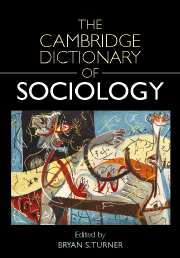L
Published online by Cambridge University Press: 22 October 2021
Summary
labeling theory
Labeling represents not a single sociological theory, but a number of different ideas relating to the notion that no behavior is deviant or criminal unless so labeled. Labeling thus refers to the process by which behaviors come to be categorized as deviant or criminal. Each society makes rules whose breach will constitute deviance or criminality.
Labeling is a derivative of the widely used sociological idea of symbolic interactionism. Interactionist theory analyzes the way in which individual actors develop conceptions of themselves on the basis of their interactions with others. This gives meaning to the behavior of individuals and places their actions and behavior in the context of their understanding of the world. Culture, sex, age, and other elements of identity all shape self-conception, of course, but the interactionists give particular emphasis to the meanings which the individual places on various occurrences and interactions. Labeling theory is drawn from this, but focuses on the impact of being labeled in a particular way on behavior.
Early 1930s work on juvenile gangs led sociological writers to recognize that the official label of “deviant” had potentially negative effects on the young people concerned. In the 1950s, Edwin Lemert in Social Pathology (1951) refined the thinking by distinguishing between primary and secondary deviation. While primary deviance might be a temporary aberration, secondary deviance was created as a reaction to the reaction of others to the initial deviance. But labeling theory is most strongly associated with Howard S. Becker in his Outsiders: Studies in the Sociology of Deviance (1963). His perspective on labeling revolved around the social reactions of a group rather than individual reactions. In a series of studies he described the processes of becoming a prostitute or a marijuana smoker and so on. In each case, it was the stigma attached to the label that was critical in shaping future behavior. Thus the labeling processes created “outsiders” and a self-fulfilling prophecy ensued. The processes of criminal justice are thus perceived to be instrumental in making matters worse.
By focusing on definitional issues, labeling theory has injected important critical thinking into criminological theorizing. It has revealed how the concepts of crime and deviance are not universally agreed but socially constructed. But labeling theory itself has attracted criticism for being ahistorical, astructural, and atheoretical.
- Type
- Chapter
- Information
- The Cambridge Dictionary of Sociology , pp. 315 - 345Publisher: Cambridge University PressPrint publication year: 2006



